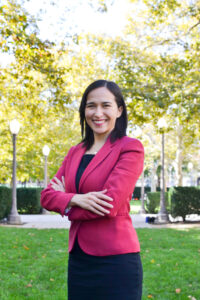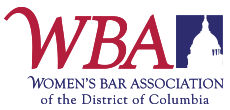
WBA celebrates Hispanic Heritage Month by celebrating the Latinx members of our community.
“Witnessing the unequal treatment that migrants and women faced in many contexts, particularly in Mexico and the United States. I also saw becoming a lawyer as an opportunity to find my own voice, and to advocate for myself and for my community.”
Aura Guerrero is an Associate at the O’Neill Institute for National and Global Health Law, Georgetown Law Center. She is an at-large board member of the Hispanic Bar Association of the District of Columbia and a member of the Hispanic National Bar Association. She is the vice president of the ITAM alumni association in Washington DC (ITAM is the Instituto Tecnológico Autónomo de México, a university located in Mexico City).
Prior to joining the O’Neill Institute, Aura externed and worked in private practice in Washington, DC and Virginia, particularly in immigration law, international arbitration, and white-collar services. As part of her work, she actively prepared filings and witnesses for immigration merit hearings, as well as for several lawsuits regarding the family separation policy implemented at the U.S.-Mexican border. She also worked at the Inter-American Human Rights Commission and has traveled to Latin America as an electoral observer on behalf of the Organization of the American States (OAS).
Before moving to the U.S. in 2017, Aura was an advisor and human rights and gender coordinator at the Electoral Tribunal of Mexico City. She worked at the Electoral Institute of Mexico City, the Federal Criminal Court of the First Circuit of Mexico, and the Federal Electoral Court chamber in Toluca.
Why did you join the WBA?
I was motivated to join the WBA when I participated at the Guatemalan retreat that the WBA organized this past February. I was inspired by the leadership and energy of all the women I met in that retreat, all of whom advised me to join and to reach out to WBA members for mentorship and guidance. It was a very special opportunity for me to find peace and wellness as well as inner growth.
How did your community growing up shape who you are now?
My community, especially my family, shaped my independence and my desire to become an agent for positive change, particularly for gender equality. My family inspired me to go out of my comfort zone and to be true to my inner self. Their support and guidance gave me the strength to migrate to the United States six years ago in order to accomplish my dream of also becoming an attorney in this country.
What motivated you to enroll in law school?
Witnessing the unequal treatment that migrants and women faced in many contexts, particularly in Mexico and the United States. I also saw becoming a lawyer as an opportunity to find my own voice, and to advocate for myself and for my community.
What advice would you give to a Hispanic/Latinx law student who aspires to be where you are now?
Be proud of who you are and dare to accomplish your goals regardless of how difficult they may seem. If you fall, get back on your feet and if you get a no for an answer, make a yes possible. ¡Sí se puede! And, always find or make your own community.
What does Hispanic Heritage Month mean to you personally, and why is it important to celebrate it?
It is important because it is an opportunity to recognize how far the Latino community has advanced and how much work we need to continue to do as a community to be heard and to have a place and decision-making power in all spheres, particularly in law and politics.
What progress or positive changes have you witnessed for the Hispanic/Latinx community in recent years?
I have witnessed how many Latinas have advanced in their legal careers and have mentored and helped other Latinas. Sorority among Latinas is a huge progress and something we should be proud of.
What are your hopes or aspirations for the future of the Hispanic/Latinx legal community?
I want to see more Latinx attorneys. As of today, we are only 5 % of the lawyers in the US. I also hope to see the number of Latina attorneys raise. Today, Latinas represent less than 2% of all attorneys.
I want us to have more Latina attorneys in leadership roles. Also, I want to see a Latino dean in a DMV law school and another Latina justice in the Supreme Court.
Do you have a mentor/hero?
I have many mentors and heroes. Two of my personal heroes are my grandmothers, who despite their own personal circumstances empowered me to study, travel, grow, and be persistent and resilient. One of my mentors from the Hispanic Bar Association of DC is Ignacia Moreno who advised me to become more involved in voluntary professional associations and helped me find resources and set professional goals. She also helped me value the importance of human connection in the legal field and embracing my Latinidad.
What is the best advice you have received?
Be yourself and listen to others.
